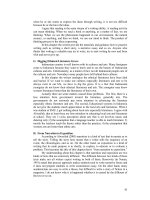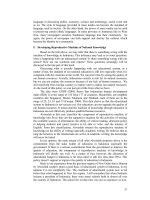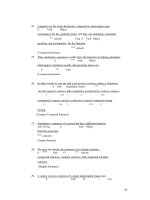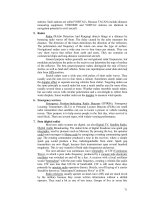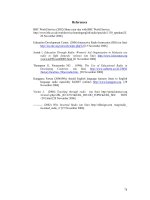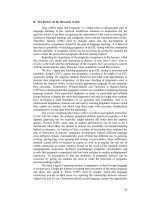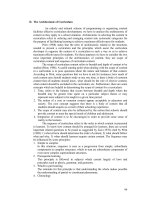Teaching and learning Legal English in businessrelated majors: Advantages and disadvantagesx
Bạn đang xem bản rút gọn của tài liệu. Xem và tải ngay bản đầy đủ của tài liệu tại đây (391.15 KB, 12 trang )
TRƯỜNG ĐẠI HỌC SƯ PHẠM TP HỒ CHÍ MINH
TẠP CHÍ KHOA HỌC
HO CHI MINH CITY UNIVERSITY OF EDUCATION
JOURNAL OF SCIENCE
KHOA HỌC GIÁO DỤC
EDUCATION SCIENCE
ISSN:
1859-3100 Tập 16, Số 8 (2019): 241-252
Vol. 16, No. 8 (2019): 241-252
Email: ; Website:
Research Article
TEACHING AND LEARNING LEGAL ENGLISH IN BUSINESSRELATED MAJORS: ADVANTAGES AND DISADVANTAGESx
Chau The Huu
Ho Chi Minh University of Foreign Languages – Information Technology
Corresponding author: Chau The Huu – Email:
Received: March 18, 2019; Revised: June 13, 2019; Accepted: July 18, 2019
ABSTRACT
This paper is composed specifically to point out the pros and cons of Legal English learning
and teaching in universities which includes business-related subjects in their curricula. The
methodology employed is qualitative method, conducted through collecting and analysing
secondary data in combination with observations and experimentation in daily classroom
activities. It has been found out that, besides such advantages as learners’ English fluency, both
practical and theoretical material diversity and up-to-date curricula in business-related
universities, lack of materials for learning, time-consuming preparation and insufficient passion
are among many issues to be addressed in teaching and learning Legal English in universities.
Keywords: business, contract, economics, ESP, Legal English.
1.
Introduction
Economic performance in Vietnam has been gaining much development in recent
years. As one of the major forces of the economy, import and export continuously achieve
success year after year. In 2017, there was a considerable increase of 21.2% in exports in
comparison with that of 2016, reaching 214.02 billion USD, while imports remained under
good control (Ministry of Industry and Trade, 2018). Undoubtedly, the number of deals
settled successfully goes hand in hand with that of trade contracts to be signed, which put a
great pressure on the company’s human resource to be responsible for contract negotiation
and signing. Moreover, the trade conflicts have been an inevitable issue in business.
Ministry of Industry and Trade (2018) confirms that until December 2017, as a World
Trade Organization (WTO)’s member, Vietnam has taken legal action in three antidumping cases against Indonesia and the United States of America (USA) and brought
them to the Dispute Settlement Body (DSB) of the WTO. Those are the issues which
Cite this article as: Chau The Huu (2019). Teaching and learning legal english in business-related majors:
advantages and disadvantages. Ho Chi Minh City University of Education Journal of Science, 16(8), 241-252.
241
Tạp chí Khoa học Trường ĐHSP TPHCM
Tập 16, Số 8 (2019): 241-252
mainly concern with trade policies from a macro-economic viewpoint, obviously followed
by a great number of other micro-cases between businesses.
A key point for Vietnamese enterprises when they have to get involved in such cases
is their understanding towards contract content and language. It is an advantage that almost
all contracts signed between Vietnamese and businesses from other countries are made in
English language – an international communication tool for global citizens. However, this
also poses some challenges for people who have just started running or are currently
operating their businesses due to their insufficient language skills, especially those of
Legal English. Although many universities and training centers have organized classes to
equip their students with necessary understanding and application in the English of Law
and specially, English for contracts, there are still many things to be done concerning from
both the aspects of learners and teachers. For the purpose of analysing the current
situations and proposing some recommendations, I have decided to conduct a study on the
topic “Teaching and learning Legal English in Business related majors: Advantages and
Disadvantages”.
The study aims to figure out the pros and cons in teaching and learning Legal English
situation at some universities which organize classes in business majors, including Foreign
Trade University HCMC Campus (FTU HCMC), HCMC University of Foreign Languages
– Information Technology (HUFLIT) and University of Education HCMC (HCMUP). It
holds a vital position in deciding the current status and suggesting appropriate guidelines
for both lecturers and students in these educational institutions specifically and others
generally.
The limitation of the study lies mainly on the timing and scale of research, which is
limited within the three universities. Furthermore, as most examples listed hereunder refer
to real context in business contract, more study needs to be conducted in other legal
documents such as legislation terms, company’s internal documents, as well as other types
of contract, namely the charter party, insurance policy, etc. However, as the distinction of
these documents is mostly concerned with content, and format other than language, the
suggestions in this study are still applicable to some extents for the above-mentioned
documents.
2.
Overview of Legal English
There have been variations in understanding and interpreting the term Legal English.
Based on purposes, ESP (English for Specific purposes) practitioners prefer to use other
terms as classification, such as EGLP (English for general legal purposes), EALP (English
for academic legal purposes), and EOLP (English for occupational legal purposes)
(Northcott, 2013). In this study, I mainly focus on some features relating to Legal English
in the case of being used in business contracts. Like other professions, law has its own
242
Tạp chí Khoa học Trường ĐHSP TPHCM
Chau The Huu
complexity, which requires learners to put much effort in order to master the principles and
contents of every single sentence, as well as paragraph. In case the terms are written in
mother tongue, readers still face difficulties in reading and comprehending the meaning of
words and sentences. Moreover, where English, or other languages, is used in composing
such provisions, the challenge becomes greater not only for common readers, but also for
those specialized such as lawyers, researchers or negotiators, etc. Northcott (2013)
confirmed that one of the sources of Legal English’s difficulty was put down to the
Common Law system, which heavily depends on precedents.
In terms of application, it is undoubted that Legal English is widely useful in life,
work and study. People need to read and understand the laws passed by legislative body as
those can affect their daily life such as new regulations on tax, shopping or transportation.
Students have to read regulations in schools and other educational institutions so as to duly
follow. In business, Legal English finds itself of great importance when being made use of
in various cases such as internal documents, and, more significantly, commercial contracts
and agreement. For the above reasons, teaching and studying Legal English remains a
crucial part in education in general, and some business – related majors in particular. Due
to the little use of Legal English in non-business related major, I primarily concentrated on
analysing the pros and cons in training this type of ESP only in business-related curricula.
It is worth noticeable that so far has this topic been studied and mentioned in a
number of research studies and books domestically and internationally. In his study namely
“Teaching Legal English: contexts and cases”, Northcott (2009) evaluated the current
situation of training Legal English for law professionals of second languages. He
concluded that ethnographic skills and partnerships between language specialists and law
experts should be strictly considered and applied in other to achieve high result in training
(Northcott, 2009). The research study set up general understanding of educating Legal
English internationally nowadays. Meanwhile, the article “Terminology translation in
teaching Legal English” by Mishchenko (2010) approached trans��������������������������������������������������������������������������������������������������������������������������������������������������������������������������������������������������������������������������������������������������������������������������������������������������������������������������������������������������������������������������������������������������������������������������������������������������������������������������������������������������������������������������������������������������������������������������������������������������������������������������������������������������������������������������������������������������������������������������������������������������������������������������������������������������������������������������������������������������������������������������������������������������������������������������������������������������������������������������������������������������������������������������������������������������������������������������������������������������������������������������������������������������������������������������������������������������������������������������������������������������������������������������������������������������������������������������������������������������������������������������������������������������������������������������������������������������������������������������������������������������������������������������������������������������������������������������������������������������������������������������������������������������������������������������������������������������������������������������������������������������������������������������������������������������������������������������������������������������������������������������������������������������������������������������������������������������������������������������������������������������������������������������������������������������������������������������������������������������������������������������������������������������������������������������������������������������������������������������������������������������������������������������������������������������������������������������������������������������������������������������������������������������������������������������������������������������������������������������������������������������������������������������������������������������������������������������������������������������������������������������������������������������������������������������������������������������������������������������������������������������������������������������������������������������������������������������������������������������������������������������������������������������������������������������������������������������������������������������������������������������������������������������������������������������������������������������������������������������������������������������������������������������������������������������������������������������������������������������������������������������������������������������������������������������������������������������������������������������������������������������������������������������������������������������������������������������������������������������������������������������������������������������������������������������������������������������������������������������������������������������������������������������������������������������������������������������������������������������������������������������������������������������������������������������������������������������������������������������������������������������������������������������������������������������������������������������������������������������������������������������������������������������������������������������������������������������������������������������������������������������������������������������������������������������������������������������������������������������������������������������������������������������������������������������������������������������������������������������������������������������������������������������������������������������������������������������������������������������������������������������������������������������������������������������������������������������������������������������������������������������������������������������������������������������������������������������������������������������������������������������������������������������������������������������������������������������������������������������������������������������������������������������������������������������������������������������������������������������������������������������������������������������������������������������������������������������������������������������������������������������������������������������������������������������������������������������������������������������������������������������������������������������������������������������������������������������������������������������������������������������������������������������������������������������������������������������������������������������������������������������������������������������������������������������������������������������������������������������������������������������������������������������������������������������������������������������������������������������������������������������������������������������������������������������������������������������������������������������������������������������������������������������������������������������������������������������������������������������������������������������������������������������������������������������������������������������������������������������������������������������������������������������������������������������������������������������������������������������������������������������������������������������������������������������������������������������������������������������������������������������������������������������������������������������������������������������������������������������������������������������������������������������������������������������������������������������������������������������������������������������������������������������������������������������������������������������������������������������������������������������������������������������������������������������������������������������������������������������������������������������������������������������������������������������������������������������������������������������������������������������������������������������������������������������������������������������������������������������������������������������������������������������������������������������������������������������������������������������������������������������������������������������������������������������������������������������������������������������������������������������������������������������������������������������������������������������������������������������������������������������������������������������������������������������������������������������������������������������������������������������������������������������������������������������������������������������������������������������������������������������������������������������������������������������������������������������������������������������������������������������������������������������������������������������������������������������������������������������������������������������������������������������������������������������������������������������������������������������������������������������������������������������������������������������������������������������������������������������������������������������������������������������������������������������������������������������������������������������������������������������������������������������������������������������������������������������������������������������������������������������������������������������������n order to master it, what the
students need is a systematic view of the structure, vocabulary and key points in
translation. Meanwhile, students studying at DIBA HUFLIT only learn Legal English
within fifteen (15) periods in the Subject of Import-export and International Payment,
which is insufficient for building the basics of such language. Due to this limitation, the
teaching and learning only focus on analysing sample contracts and documents (Chau,
2015).
247
Tạp chí Khoa học Trường ĐHSP TPHCM
Tập 16, Số 8 (2019): 241-252
On the other hand, lack of academic materials also raises an obstacle for teaching
and learning Legal English. Despite the availability of sample items online, transferring
knowledge require a systematic root, which is not mentioned commonly in current
Business English textbooks used in university. This is also the reason why teachers have to
spend much time preparing for lessons as they have to look for, read and analyse relevant
documents in order to produce good lectures.
4.
Suggestions for improving teaching and learning Legal English in businessrelated majors.
4.1. For students
4.1.1. Key points in learning
* In terms of grammatical points which are worth memorizing and practicing, I would
suggest the following:
- Nguyen (2007) concluded that regarding the order and types of clauses, there are
four (4) types of sentence structures to remember when learning Legal English in business
and contractual context.
(1) Main clause + Main clause (together with conjunctions such as and, but, or, etc.)
(2) Main clause + Subordinating clause (or in reversed order)
(3) Main clause + Subordinating clauses (more than two subordinating clause)
(4) Subordinating clause A + Mail clause + Subordinating clause B
Among these, type 4 is the most complicated and most commonly used in Legal
English. Take a term from a rice export contract as an example “Should any dispute arise
between the contracting parties to which no agreement can be reached, these disputes
shall be settled by arbitration, which shall take place in Singapore as per arbitration rule
number 125 of GAFTA.” (Chau, 2016). As can be seen, the above sentence is composed
from the combination of Adverbial clause of condition and an Adjective clause, which
makes it complex for readers.
- It is also noted that the Simple present tense and the Passive voice are commonly
used in Legal English, and sometimes accompanied by “shall” as modal verb, which
means “must”. For example, a clause of Force Majeure terms says that “If at the end of
Force Majeure period, shipment is still prevented by any of the above causes, the Contract
shall be void unless a further extension is mutually agreed” (Chau, 2016). However, the
use of passive voice and active voice should be appropriate so as to express the parties’
intention precisely; otherwise, it would lead the reader to unnecessary confusion when
interpreting the terms (Nguyen, 2007).
248
Tạp chí Khoa học Trường ĐHSP TPHCM
Chau The Huu
* Regarding vocabulary to be used in the language of contract, besides terminology
which is only available in specific contractual terms such as payment, delivery
transportation or insurance terms, archaic terms (such as hereto or aforementioned, ect.)
are also worth being paid attention due to their frequent appearance in such context. On the
other hand, it is also noted that strings of synonymous words are commonly employed in
legal documents, especially business contracts, as it helps both readers and compilers avoid
misunderstanding or being insufficiently aware when trying to translate them into their
own favoured languages. Some examples to be mentioned include terms and conditions;
loss, injury or damage; by and between; final and binding; use, misuse or abuse, etc.
(Zhang, 2014).
* Translating the text of Legal English requires more effort than that of other kinds not
only because of complicated vocabulary and structure but also due to appropriate skills and
patience of the translator. In order for a word, phrase, sentence or paragraph to be fully
understood and translated, it is advisable that the translator needs to find out its definition,
the context in which the meaning of such term is conveyed, and the source of relevant
ordinances and case (Northcott, 2013).
4.1.2. Passion for learning
Generating passion for learning is of great importance for students as it helps with
placing the strong motivation when starting and continuing studying. Unlike other kinds of
English, Legal English seems boring and demotivating to learners due to its own
complexity. Therefore, students have to think forward of how useful it would be if they
master it well, or how much they can use their own Legal English vocabulary and
structures in solving daily problems in their lives and work. Moreover, students can seek
advice from teachers whenever they encounter difficulties and lose their motivation in
approaching problems of Legal English.
4.2. For teachers and educational organizations
The first thing that the teachers or lecturers need to do is to enhance their own
understanding of both Legal English in terms of linguistics and knowledge of current
domestic and international legal system. This is not an easy task, especially for those who
are not specialized in these fields. It requires a high sense of responsibility together with
strong patience when preparing for every lesson. Moreover, a thorough awareness of
business environment does help the teachers in conveying lessons of corporate issues for
students.
Secondly, in order for the lecture to be well-prepared academically, I would strongly
recommend the two books of the series Cambridge’s Professional English: “Introduction to
International Legal English” and “International Legal English” by Amy Krois-Lindner and
other co-authors. Both focus to build language skills in legal contexts. The former includes
249
Tạp chí Khoa học Trường ĐHSP TPHCM
Tập 16, Số 8 (2019): 241-252
ten (10) units mentioning different aspects of each types of law such as contract law,
criminal law, tort law, etc. (Krois-Lindner, Firth, & Translegal®, 2009) Meanwhile, the
second is a more intensive one, which consists of fifteen (15) units giving a further and
more comprehensive practice of skills in such contexts as employment law, contract
remedies, intellectual property, etc. (Krois-Lindner & Translegal®, 2006). Moreover,
accumulating online and up-to-date materials is considered as an obligatory work while
preparing for Legal English lectures. Teachers who are in favour of business context
application can find useful sample contracts and terms in WTO (World Trade
Organization)’s or ICC (International Chamber of Commerce)’s website. Obviously, the
students would find it appealing when being taught the lesson and given an opportunity to
use what they have just learned to the real career or life. I would also recommend some
types of exercises to be created to enhance student’s practice, which includes questions on
terminology, translation and contractual terms composing. On the other hand, both
listening, reading and speaking comprehension are also applicable.
In addition, more time or credit should be allocated for the proportion of Legal
English in corresponding subjects. Through this adjustment, the universities or educational
organization has put the very first and serious step for this subject or topic to be addressed
fully later.
5.
Conclusion
It has been proved by the study that Legal English, in spite of its difficulty, has
gained more attention from teachers, students and researchers so far thanks to its
importance in both business and daily life. However, teaching and learning this kind of
English include both strong and weak points, which are mostly due to the available
materials and ability of both teachers and students. Finally, suggestions are given to the
relevant parties, which include students, teachers and educational organizations. I would
like to put a stress on connecting teaching knowledge and practicing in real circumstances
as it is particularly influential in forming a good and thorough understanding of Legal
English. Due to some limitations, namely little time for research, small scale in research
methodology and some general guidelines, I still hope that this topic has drawn a picture
with many colors. Further research into this topic may discuss more effective ways in
developing each specific skill in legal context or focusing on other fields of Legal English,
not just in business contracts as mentioned.
Conflict of Interest: Author have no conflict of interest to declare.
250
Tạp chí Khoa học Trường ĐHSP TPHCM
Chau The Huu
REFERENCES
Amtecol,
& Indochina.
(2018). Amtecol license agreement. Retrieved from
/>ing
Chau, T. H. (2015). Facilitating Basic Legal English for DIBA students. Conference on Selfaccessing and restructuring Curricula at the Department of International Business
Administration, Ho Chi Minh City University of Foreign Languages – Information
technology.
Chau, T. H. (2016). Some notes on English language in International Sales Contracts. Vietnam
Logistics Review, (110), 68-71.
Doan, T. H. V., & Kim, N. D. (2016). Textbook on Import-export management. Ho Chi Minh City:
University of Economics Ho Chi Minh City Publishing house.
Krois-Lindner, A., Firth, M., & Translegal®. (2009). Introduction to International Legal English A course for classroom or self-study use. Cambridge: Cambridge University Press.
Krois-Lindner, A., & Translegal®. (2006). International Legal English - A course for classrom or
self-study use. Cambridge: Cambridge University Press.
Ministry of Industry and Trade. (2018). Report on Imports and Exports of Vietnam 2017. Ha Noi
Industry and Trade Publishing house.
Mishchenko, V. (2010). Terminology translation in teaching legal English. English for Specific
Purposes World, 9(29).
Nguyen, X. M. (2011). Import-export contracts - Legal, Operational and Linguistic approach. Ho
Chi Minh City: Ho Chi Minh City National University.
Nguyen, T. Đ. (2007). International Trade Contracts (6th ed.): Hanoi Labour Publisher.
Northcott, J. (2009). Teaching Legal English: Contexts and cases. English for specific purposes in
theory and practice, 165-185.
Northcott, J. (2013). Legal English. In B. Paltridge & S. Starfield (Eds.), The Handbook of English
for Specific Purposes (pp. 210-226). London: Wiley-Blackwell.
Zhang, G. (2014). A Comparative Analysis of Lexical Features of Contract English. International
Journal on Studies in English Language and Literature (IJSELL), 2, 56-64.
251
Tạp chí Khoa học Trường ĐHSP TPHCM
Tập 16, Số 8 (2019): 241-252
GIẢNG DẠY VÀ HỌC TẬP TIẾNG ANH PHÁP LÍ
TRONG CÁC NGÀNH KINH DOANH: THUẬN LỢI VÀ KHÓ KHĂN
Châu Thế Hữu
Trường Đại học Ngoại ngữ - Tin học Thành phố Hồ Chí Minh
Tác giả liên hệ: Châu Thế Hữu – Email:
Ngày nhận bài: 18-3-2019; ngày nhận bài sửa: 13-6-2019; ngày duyệt đăng: 18-7-2019
TÓM TẮT
Bài viết được thực hiện nhằm chỉ ra những thuận lợi và khó khăn trong việc giảng dạy và
học tập tiếng Anh pháp lí tại các trường đại học có các môn học liên quan đến kinh tế và kinh
doanh. Phương pháp nghiên cứu là phương pháp định tính, được thực hiện thông qua việc thu thập
và phân tích dữ liệu thứ cấp, kết hợp với quan sát và thử nghiệm của tác giả trong quá trình giảng
dạy. Kết quả cho thấy bên cạnh một số thuận lợi như trình độ tiếng Anh khá của người học, sự đa
dạng của tài liệu về cả lí thuyết lẫn thực hành và mức độ cập nhật vào chương trình dạy học của
các trường có ngành đào tạo liên quan, việc dạy và học tiếng Anh pháp lí còn nhiều tồn tại cần
khắc phục như: thiếu tài liệu giảng dạy, việc chuẩn bị bài tốn nhiều thời gian cũng như sự thiếu
đam mê từ người học.
Từ khóa: ESP, kinh doanh, kinh tế, hợp đồng, tiếng Anh pháp lí.
252

